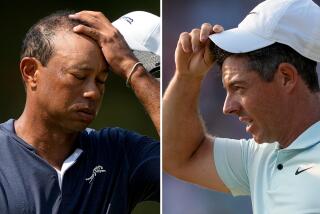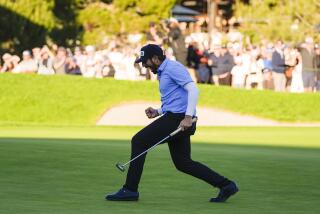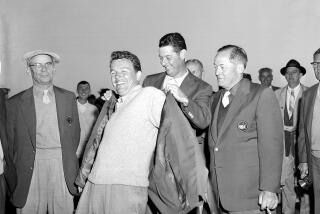Winning the Open a Losing Proposition
- Share via
INDIAN WELLS — The U.S. Open is the biggest prize in golf. For a horseman, it’s the Kentucky Derby; a race driver, it’s Indy; a boxer, it’s the heavyweight title. For a golfer, it’s the Open.
Davis Love III once said he would give all eight of his regular PGA Tour victories for one “major.” And the Open is the ultimate major.
Some time in the future when they’re trying to measure the prowess and place in history of a golfer, they’ll always ask: “How many Opens did you win?” Or even: “Did you ever win the Open?” It has always been the measure of golfing greatness.
Having said that, though, it now behooves you to examine the Open for warts and all. To see what it has done for golfers lately.
Is it a glorious victory--or is it a hoodoo?
You begin by noticing that it has been a lamentable fact of life that a golfer wins the Open--and then goes off-screen, so to speak. Doesn’t win anything else.
It wasn’t always thus. Byron Nelson won the 1939 Open--and six years later won 11 tournaments in a row and 18 for the year. Ben Hogan not only won an Open, he won three more and a flock of other victories, 63 in all. Jack Nicklaus’ first victory, the first of 70, was an Open.
But lately, the Open has been a dead-end. Look at the record.
Curtis Strange won two Opens in a row. And has not won a tournament since his last Open. And that was 1989.
Payne Stewart won the Open in ’91. And has not won a tournament since.
Lee Janzen won the Open last June. And has not won since.
Andy North won the Open in ’78 and never won another tournament--except another Open (in ‘85). Of course, Andy never won much of anything (one tournament) before winning his first Open.
It’s almost as if a guy says, “There! I’ve won the Open. What more do you want from me?”
It’s hard to overlook. Hale Irwin won three Opens--and 16 other tournaments. But he has won only one other since his last Open victory in 1990. And he won that one the week after the Open.
I don’t mean to suggest a player will come up to the 72nd hole of an Open needing a seven-foot putt to win, and will deliberately miss it so as not to jinx himself. Not want to ruin his chances to win the Hartford Open, so to say.
It’s a nice jinx to have. But it’s getting to be a permanent cloud over the winner’s head. He’s getting like that character in Li’l Abner. Joe Bftsplk, the Open winner.
Does an Open take that much out of a golfer? Well, consider that the USGA, which puts on the Open, goes to great lengths to ensure a player has to work like a sled dog to win its tournament. It grows the rough high and wiry. It hides the pins in locations you can’t find without a compass--usually tucked behind a sand trap or near water. It rolls the greens till they’re as slick as if they’d been waxed. It picks the courses that are already too tough to play--and they make them tougher. One year, they sent out for a fully grown tree to block a shortcut to a hole. They’d truck in alligators if they had to keep guys from shooting 62s. Make every other trap quicksand. Mine the fairways.
There are really three schools of thought on the tour. There are golfers who point for the majors, who consider everything else merely complicated practice rounds.
But these guys were always confident the lesser opens would fall their way in the normal course of things. After all, Nicklaus won 70 and Hogan 63.
The second school of thought is to win as many tournaments as possible, not to make any real distinction between the U.S. Open and any Buick Classic. This bunch figures that in the normal course of things an Open will fall their way. Tom Kite, the ’92 champion, kind of represents this school.
There’s a third school of thought that strives simply to make money. These are guys who make little distinction between one victory--or four fourths. They measure success with a calculator. They are the bricklayers of the game. It’s not really a game at all, it’s a business. They should be in a bank, not on a green.
Curtis Strange never played for mere money in his life. He played for the Hall of Fame, not the Bank of America. He never laid up on a shot to protect second money--or third money or a top-10 finish. Strange went for the victory, not the dough. He had won 15 tournaments before he won his first Open.
Golf is a game in which you hit that Wall of Pain the way marathon runners do. It’s out there in mid-career. The trick is to play through it, take your lumps, wait for it all to come back. The great ones know it will. The others drop completely out of sight. They have locked-in flaws. The game has undone them mentally, physically, psychologically. The pro shops are full of guys who had it, lost it and said to hell with it.
Strange is not about to strike his colors. Strange is this kind of player: He shot an opening-round 80 at a Masters one year (1985) but was leading the tournament by late Sunday afternoon.
He is conceding nothing to the game. He hopes the Strange Interlude is over. “Let’s just say I’m stubborn,” he laughs.
He opened with a respectable 70 at the Bob Hope Chrysler Classic tournament down here this week. In a field full of guys who only dream of one day winning the Open, he has won two. Was it a Jonah?
Curtis contemplates the question. “I think when you win the Open and accomplish the dream of a lifetime, there is a mental letdown of sorts. You kind of have great expectations of yourself and don’t expect to have to work as hard anymore. You sort of expect the game to do something for you instead of the other way round.”
In other words, he is asked, do you tend to say, “Hey! I’ve won two Opens and this is only the Kemper Open, why aren’t I leading?”
Strange shakes his head. “You tend to get impatient with poor shots or less-than-perfect shots but you have to remember less-than-perfect shots win Opens. They are part of this game and you have to learn to deal with them.”
So, he won’t find himself standing on the 18th tee of the final round with a chance to win the Open and say to himself, “Uh-oh, I’m not going to make that mistake again. I’ll hit this one in the water”?
Curtis smiles. “I’ll win all the Opens I have a shot at. Also all the Bob Hopes.”
More to Read
Go beyond the scoreboard
Get the latest on L.A.'s teams in the daily Sports Report newsletter.
You may occasionally receive promotional content from the Los Angeles Times.










